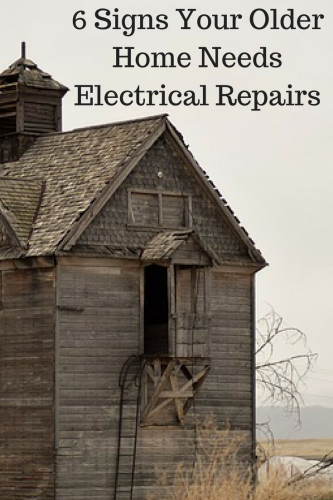
Older homes require extra care. Unlike the latest studio apartments or minimally designed flats, an older homes bear a touch of ethnicity — a contributing factor that may have inspired you to opt for such a house instead of a new one. However, to ensure the safety of your family in an older home, you must be critical while checking out its electrical system.
The main reason why you should be extra careful is because the design of electrical systems in older houses doesn’t comply with modern technologies. Therefore, it is a matter of paramount importance that you get the system thoroughly checked y professionals before settling in permanently. Qualified electricians working with Gordon Powers may help you in a situation like this.
Here’s a list of 6 signs that strongly indicate that your home needs electrical repairs.
- Heating Up Of Switches
May be the switches in your older home are working fine as far as turning the lights on and off is concerned. But, you need to be worried if they start heating up. It means that the wiring system of the house is old and experiencing an electrical overload, which, if not attended at the earliest, may lead to devastating consequences.
- Worn Out Electrical Outlets
Don’t assume that you are in danger just because the electrical outlets look old. However, it is good to make sure that these outlets are duly checked by experts before you settle in. Faulty wiring systems may cause sparks in the electrical outlets. If you experience these problems even after settling in or witness soot on outlets, then before changing these outlets, prioritize on changing the wiring, and maybe look into a fuse box upgrade as that may need changing too.
- Frequent Tripping of Circuit Breakers
Circuit overload may lead to dangerous consequences, such as electric fire and circuit breakers protect you from such occurrences. They also act as indicators whether your home wiring system is safe and dependable. If you see that these circuit breakers are tripping too frequently, then you to need to understand that the overload problem is a serious concern. Therefore, it requires an overhaul by expert electricians.
- Burning Smell
Electrical circuitry of older homes often cause overheating of the wiring. If you sense something burning and the pungent smell is coming from one of the outlets, then you are right to doubt the electric system of your old home. Seek professional assistance at the earliest.
- Blubs Blowing Out Sooner Than Expected
Faulty wiring system of your home may blow out incandescent bulbs more frequently than expected. Average lifespan of these blubs varies from 1,000 to 2,000 hours. If you see that their life expectancy is not met, then get your home wiring system checked.
- High Electricity Bills
If you are facing the problem of high electricity bills since shifting to the new house, then your house wiring system requires repairing. Corroded elements in the wiring system of your older home draw more power to run your electrical appliances. So, even if you don’t find any direct evidence or signs of circuit overloading, overheating or tripping, you can be sure that without right action at the earliest, more serious problem may occur in the near future.
Watch out for these six signs and get the repairs done in your home before it snowballs into a serious safety issue.






Kristin C says
Thanks for the tips. I will keep this is mind in the future.
Julie Wood says
I need to replace worn out electrical outlets. They are old and someone had their house burned down because of an old electrical outlet. So important to make sure an older home’s electrical system is in good shape.
Linda Manns Linneman says
This is some information we all can use. I learned alot from your article on what to look for. Thank you so much for sharing
Janet W. says
I know electrical repairs can be very expensive, but it’s definitely worth the cost to make sure repairs are done correctly.
Mia says
Electrical repairs are an area that I certainly want a professional to do the work. Thanks for the reminders of what would signal that work was in order.